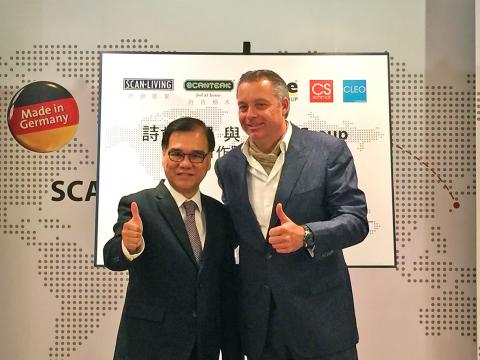Scan-D Corp (詩肯), which designs and sells teak furniture under the Scanteak brand, yesterday said it would continue to expand its Taiwanese operations, despite weakening market sentiment.
“We feel that the current downturn represents an opportunity to continue expanding into more segments,” Scan-D chairman Lim Pok Chin (林福勤) said after announcing a partnership with Germany-based Nolte Group, the largest furniture maker in Europe.
Scan-D, which operates 82 Scanteak stores and 12 Scan Living outlets in Taiwan, plans to add eight more Scan Living outlets this year and further expand the figure to 100 in a decade, Lim said.

Photo: Yang Ya-min, Taipei Times
He said that the company has weathered similar downturns since its founding in Singapore in 1974 and that the company is not especially affected by this one.
“We estimate a 1 percent quarterly decline in the April-to-June period, compared with the 50 percent to 70 percent drop reported by our peers operating in Taipei’s Wugu District (五股),” Lim said.
In the first six months of the year, the company’s cumulative sales were down 0.75 percent to NT$793.86 million (US$25 million) from the same period last year, company data showed.
Net income in the first quarter was NT$56.4 million, compared with NT$63.2 million the previous year.
The company has not released its second-quarter profit figure and declined to provide a sales guidance for the second half, saying that visibility remains low in the furniture business.
However, Taiwan remains a major market for the company and a logistics center built two years ago is scheduled to commence operations this year, replacing rented warehouses in Wugu District, said Tommy Ho (何山壯), a senior manager in the finance department.
“Taiwanese consumers do not like to wait on purchases, so we must ensure ample stock and swift delivery times,” Ho said.
Scan-D’s products are characterized by Scandinavian-style design and are priced in the mid to high-end range. In order to strengthen the company’s foothold in the mid-range market, the company has acquired exclusive distribution rights in Taiwan for Nolte Group’s CS Schmal brand.
“CS Schmal’s Cleo series of wood and glass paneled furniture represents the ideal addition to our product mix,” Lim said.
Nolte Group director of export sales Frank Renders said the Cleo series is ideal for smaller Taiwanese homes.
“We plan to bring CS Schmal’s Rio Art furniture series to capture the market for home storage and organization products in Taiwan,” Renders said.
Looking ahead, Scan-D plans to introduce a new brand next month, followed by two more German brands in October.
“In light of the dwindling prospects in the top tier, we are adopting a similar approach to apparel giants Uniqlo and Zara, and are striving to bring high-quality products with European design aesthetics at accessible prices to the Taiwanese market,” Lim said.
Scan-D shares rose 2.18 percent to close at NT$51.6 in Taipei trading yesterday. The shares have declined 35.9 percent since the beginning of the year.

Merida Industry Co (美利達) has seen signs of recovery in the US and European markets this year, as customers are gradually depleting their inventories, the bicycle maker told shareholders yesterday. Given robust growth in new orders at its Taiwanese factory, coupled with its subsidiaries’ improving performance, Merida said it remains confident about the bicycle market’s prospects and expects steady growth in its core business this year. CAUTION ON CHINA However, the company must handle the Chinese market with great caution, as sales of road bikes there have declined significantly, affecting its revenue and profitability, Merida said in a statement, adding that it would

i Gasoline and diesel prices at fuel stations are this week to rise NT$0.1 per liter, as tensions in the Middle East pushed crude oil prices higher last week, CPC Corp, Taiwan (台灣中油) and Formosa Petrochemical Corp (台塑石化) said yesterday. International crude oil prices last week rose for the third consecutive week due to an escalating conflict between Israel and Iran, as the market is concerned that the situation in the Middle East might affect crude oil supply, CPC and Formosa said in separate statements. Front-month Brent crude oil futures — the international oil benchmark — rose 3.75 percent to settle at US$77.01

RISING: Strong exports, and life insurance companies’ efforts to manage currency risks indicates the NT dollar would eventually pass the 29 level, an expert said The New Taiwan dollar yesterday rallied to its strongest in three years amid inflows to the nation’s stock market and broad-based weakness in the US dollar. Exporter sales of the US currency and a repatriation of funds from local asset managers also played a role, said two traders, who asked not to be identified as they were not authorized to speak publicly. State-owned banks were seen buying the greenback yesterday, but only at a moderate scale, the traders said. The local currency gained 0.77 percent, outperforming almost all of its Asian peers, to close at NT$29.165 per US dollar in Taipei trading yesterday. The

RECORD LOW: Global firms’ increased inventories, tariff disputes not yet impacting Taiwan and new graduates not yet entering the market contributed to the decrease Taiwan’s unemployment rate last month dropped to 3.3 percent, the lowest for the month in 25 years, as strong exports and resilient domestic demand boosted hiring across various sectors, the Directorate-General of Budget, Accounting and Statistics (DGBAS) said yesterday. After seasonal adjustments, the jobless rate eased to 3.34 percent, the best performance in 24 years, suggesting a stable labor market, although a mild increase is expected with the graduation season from this month through August, the statistics agency said. “Potential shocks from tariff disputes between the US and China have yet to affect Taiwan’s job market,” Census Department Deputy Director Tan Wen-ling